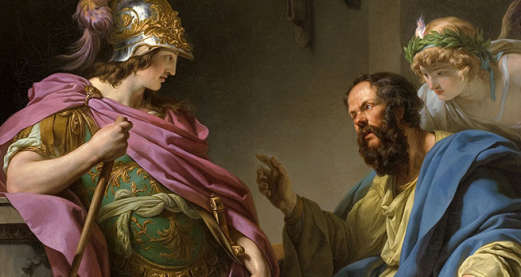Find out more about The Open University's Philosophy courses and qualifications
 Alcibiades being taught by Socrates
Socrates (469/470-399 BCE) was a Greek philosopher and is considered the father of western philosophy. Plato was his most famous student and would teach Aristotle who would then tutor Alexander the Great. By this progression, Greek philosophy, as first developed by Socrates, was spread throughout the known world during Alexander's conquests.
Alcibiades being taught by Socrates
Socrates (469/470-399 BCE) was a Greek philosopher and is considered the father of western philosophy. Plato was his most famous student and would teach Aristotle who would then tutor Alexander the Great. By this progression, Greek philosophy, as first developed by Socrates, was spread throughout the known world during Alexander's conquests.
Socrates was born c. 469/470 BCE to the sculptor Sophronicus and the mid-wife Phaenarete. He studied music, gymnastics, and grammar in his youth (the common subjects of study for a young Greek) and followed his father's profession as a sculptor. Tradition holds that he was an exceptional artist, and his statue of the Graces, on the road to the Acropolis, is said to have been admired into the 2nd century CE. Socrates served with distinction in the army and, at the Battle of Potidaea, saved the life of the General Alcibiades.
When he was middle-aged, Socrates' friend Chaerephon asked the famous Oracle at Delphi if there was anyone wiser than Socrates, to which the Oracle answered, "None." Bewildered by this answer and hoping to prove the Oracle wrong, Socrates went about questioning people who were held to be 'wise' in their own estimation and that of others. He found, to his dismay, "that the men whose reputation for wisdom stood highest were nearly the most lacking in it, while others who were looked down on as common people were much more intelligent" (Plato, Apology, 22). The youth of Athens delighted in watching Socrates question their elders in the market and, soon, he had a following of young men who, because of his example and his teachings, would go on to abandon their early aspirations and devote themselves to philosophy (from the Greek 'Philo', love, and 'Sophia', wisdom - literally 'the love of wisdom'). Among these were Antisthenes (founder of the Cynic school), Aristippus (the Cyrenaic school), Xenophon (whose writings would influence Zeno of Cithium, founder of the Stoic school) and, most famously, Plato (the main source of our information of Socrates in his Dialogues) among many others. Every major philosophical school mentioned by ancient writers following Socrates' death was founded by one of his followers.
The diversity of these schools is testimony to Socrates' wide ranging influence and, more importantly, the diversity of interpretations of his teachings. The philosophical concepts taught by Antisthenes and Aristippus could not be more different, in that the former taught that the good life was attained by self-control and self-abnegation, while the latter claimed a life of pleasure was the only path worth pursuing. It has been said that Socrates' greatest contribution to philosophy was to move intellectual pursuits away from the focus on 'physical science' (as pursued by the so-called Pre-Socratic Philosophers such as Thales, Anaximander, Anaximenes, and others) and into the abstract realm of ethics and morality. No matter the diversity of the schools which claimed to carry on his teachings, they all emphasized some form of morality as their foundational tenet. That the 'morality' espoused by one school was often condemned by another, again bears witness to the very different interpretations of Socrates' central message. While scholars have traditionally relied upon Plato's Dialogues as a source for information on the historical Socrates, Plato's contemporaries claimed he used a character he called 'Socrates' as a mouth-piece for his own philosophical views. Notable among these critics was, allegedly, Phaedo, a fellow student of Socrates, whose writings are now lost, and Xenophon, whose Memorablia presents a different view of Socrates than that presented by Plato.
However his teachings were interpreted, it seems clear that Socrates' main focus was on how to live a good and virtuous life. The claim atrributed to him by Plato that "an unexamined life is not worth living" (Apology, 38b) seems historically accurate, in that it is clear he inspired his followers to think for themselves instead of following the dictates of society and the accepted superstitions concerning the gods and how one should behave. While there are differences between Plato's and Xenophon's depictions of Socrates, both present a man who cared nothing for class distinctions or 'proper behavior' and who spoke as easily with women, servants, and slaves as with those of the higher classes.
This article was originally published on Ancient.eu, written by Joshua J. Mark and released under the Creative Commons BY-NC-SA 3.0 licence.





Rate and Review
Rate this article
Review this article
Log into OpenLearn to leave reviews and join in the conversation.
Article reviews